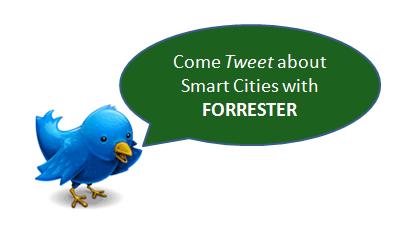Join Forrester’s Smart Cities Tweet Jam, November 9th at 11am EDT/8am PDT/5pm CET
 What’s your approach to the smart city? What's your role? Join Forrester Analysts, IT decision-makers, vendor strategists, and other Tweeters in our upcoming Smart Cities Tweet Jam – a Twitter-based dialogue about smart cities – on Tuesday, November 9th from 11:00am to 12:00pm EDT (8:00am to 9:00am PDT and 5:00 to 6:00pm CET), using the Twitter hashtag #smartcityjam. From Forrester, Doug Washburn (@dougwashburn), Usman Sindhu (@usmansindhu) and I (@jenbelissent) will be joining – and likely others. Doug and Usman have written about what “Smart Cities” mean for CIOs of all kinds – the CIO of the city, the CIO of a component city service or infrastructure, and the CIO who consumes or interfaces with smart city infrastructure. Take a look at their report, Helping CIOs Understand "Smart City" Initiatives. My upcoming report, "Capitalizing on Smart Cities," will look at opportunities for tech vendors, including a look at alternatives types of “cities” and innovative business models to increase the long-term viability of smart city initiatives. The report is not yet out, but some of the ideas have been shared in recent blog posts on the definition of a “city,” new business models, and redefining the “public” sector.
What’s your approach to the smart city? What's your role? Join Forrester Analysts, IT decision-makers, vendor strategists, and other Tweeters in our upcoming Smart Cities Tweet Jam – a Twitter-based dialogue about smart cities – on Tuesday, November 9th from 11:00am to 12:00pm EDT (8:00am to 9:00am PDT and 5:00 to 6:00pm CET), using the Twitter hashtag #smartcityjam. From Forrester, Doug Washburn (@dougwashburn), Usman Sindhu (@usmansindhu) and I (@jenbelissent) will be joining – and likely others. Doug and Usman have written about what “Smart Cities” mean for CIOs of all kinds – the CIO of the city, the CIO of a component city service or infrastructure, and the CIO who consumes or interfaces with smart city infrastructure. Take a look at their report, Helping CIOs Understand "Smart City" Initiatives. My upcoming report, "Capitalizing on Smart Cities," will look at opportunities for tech vendors, including a look at alternatives types of “cities” and innovative business models to increase the long-term viability of smart city initiatives. The report is not yet out, but some of the ideas have been shared in recent blog posts on the definition of a “city,” new business models, and redefining the “public” sector.
We’ll start with a set of questions to initiate the conversation, but we welcome input from the community as we discuss trends in smart city initiatives. We hope that others bring examples of innovation in the public sector, both in terms of the solutions deployed but also in terms of the collaboration across organizations and business models employed. The conversation will span subjects from political, economic and social drivers to prioritization of critical issues to adoption of specific technologies to potential obstacles and funding sources.
Here are some of the questions we want to discuss and debate during our Tweet Jam:
- What is a “city” (to start with the somewhat esoteric)?
- What is a smart city? Or more precisely, how best does a city get smarter?
- Can a city evolve from one initiative like “smart grid” to a broader smart agenda? How?
- What are the major obstacles for implementing technology within a city?
- What are the new business models that enable technology adoption in the public sector?
- What is the role of the CIO? What is the role of technology vendors?
- Is “smart” a fade? Will the “smart city” wave quickly fade? What will remain?
We’d love to hear if there are any other questions or issues you think we should cover. To join the conversation, tune in to the #smartcityjam hashtag on Twitter or follow the analysts above.
We look forward to hearing views from a broad audience and welcome participation from all.